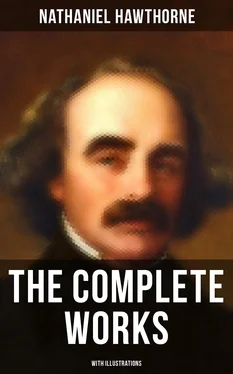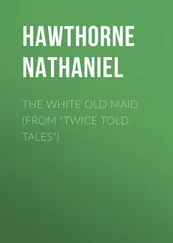Edward proceeded on his journey, meeting with no other noticeable event, till, arriving at the summit of a hill, he beheld, a few hundred yards before him, the Rev. Dr. Melmoth. The worthy president was toiling onward at a rate unexampled in the history either of himself or his steed; the excellence of the latter consisting in surefootedness rather than rapidity. The rider looked round, seemingly in some apprehension at the sound of hoof-tramps behind him, but was unable to conceal his satisfaction on recognizing Edward Walcott.
In the whole course of his life, Dr. Melmoth had never been placed in circumstances so embarrassing as the present. He was altogether a child in the ways of the world, having spent his youth and early manhood in abstracted study, and his maturity in the solitude of these hills. The expedition, therefore, on which fate had now thrust him, was an entire deviation from the quiet pathway of all his former years; and he felt like one who sets forth over the broad ocean without chart or compass. The affair would undoubtedly have been perplexing to a man of far more experience than he; but the doctor pictured to himself a thousand difficulties and dangers, which, except in his imagination, had no existence. The perturbation of his spirit had compelled him, more than once since his departure, to regret that he had not invited Mrs. Melmoth to a share in the adventure; this being an occasion where her firmness, decision, and confident sagacity — which made her a sort of domestic hedgehog — would have been peculiarly appropriate. In the absence of such a counsellor, even Edward Walcott — young as he was, and indiscreet as the doctor thought him — was a substitute not to be despised; and it was singular and rather ludicrous to observe how the gray-haired man unconsciously became as a child to the beardless youth. He addressed Edward with an assumption of dignity, through which his pleasure at the meeting was very obvious.
“Young gentleman, this is not well,” he said. “By what authority have you absented yourself from the walls of Alma Mater during term-time?”
“I conceived that it was unnecessary to ask leave at such a conjuncture, and when the head of the institution was himself in the saddle,” replied Edward.
“It was a fault, it was a fault,” said Dr. Melmoth, shaking his head; “but, in consideration of the motive, I may pass it over. And now, my dear Edward, I advise that we continue our journey together, as your youth and inexperience will stand in need of the wisdom of my gray head. Nay, I pray you lay not the lash to your steed. You have ridden fast and far; and a slower pace is requisite for a season.”
And, in order to keep up with his young companion, the doctor smote his own gray nag; which unhappy beast, wondering what strange concatenation of events had procured him such treatment, endeavored to obey his master’s wishes. Edward had sufficient compassion for Dr. Melmoth (especially as his own horse now exhibited signs of weariness) to moderate his pace to one attainable by the former.
“Alas, youth! these are strange times,” observed the president, “when a doctor of divinity and an undergraduate set forth, like a knight-errant and his squire, in search of a stray damsel. Methinks I am an epitome of the church militant, or a new species of polemical divinity. Pray Heaven, however, there be no encounter in store for us; for I utterly forgot to provide myself with weapons.”
“I took some thought for that matter, reverend knight,” replied Edward, whose imagination was highly tickled by Dr. Melmoth’s chivalrous comparison.
“Ay, I see that you have girded on a sword,” said the divine. “But wherewith shall I defend myself, my hand being empty, except of this golden headed staff, the gift of Mr. Langton?”
“One of these, if you will accept it,” answered Edward, exhibiting a brace of pistols, “will serve to begin the conflict, before you join the battle hand to hand.”
“Nay, I shall find little safety in meddling with that deadly instrument, since I know not accurately from which end proceeds the bullet,” said Dr. Melmoth. “But were it not better, seeing we are so well provided with artillery, to betake ourselves, in the event of an encounter, to some stonewall or other place of strength?”
“If I may presume to advise,” said the squire, “you, as being most valiant and experienced, should ride forward, lance in hand (your long staff serving for a lance), while I annoy the enemy from afar.”
“Like Teucer behind the shield of Ajax,” interrupted Dr. Melmoth, “or David with his stone and sling. No, no, young man! I have left unfinished in my study a learned treatise, important not only to the present age, but to posterity, for whose sakes I must take heed to my safety. — But, lo! who ride yonder?” he exclaimed, in manifest alarm, pointing to some horsemen upon the brow of a hill at a short distance before them.
“Fear not, gallant leader,” said Edward Walcott, who had already discovered the objects of the doctor’s terror. “They are men of peace, as we shall shortly see. The foremost is somewhere near your own years, and rides like a grave, substantial citizen, — though what he does here, I know not. Behind come two servants, men likewise of sober age and pacific appearance.”
“Truly your eyes are better than mine own. Of a verity, you are in the right,” acquiesced Dr. Melmoth, recovering his usual quantum of intrepidity. “We will ride forward courageously, as those who, in a just cause, fear neither death nor bonds.”
The reverend knight-errant and his squire, at the time of discovering the three horsemen, were within a very short distance of the town, which was, however, concealed from their view by the hill that the strangers were descending. The road from Harley College, through almost its whole extent, had been rough and wild, and the country thin of population; but now, standing frequent, amid fertile fields on each side of the way, were neat little cottages, from which groups of white-headed children rushed forth to gaze upon the travellers. The three strangers, as well as the doctor and Edward, were surrounded, as they approached each other, by a crowd of this kind, plying their little bare legs most pertinaciously in order to keep pace with the horses.
As Edward gained a nearer view of the foremost rider, his grave aspect and stately demeanor struck him with involuntary respect. There were deep lines of thought across his brow; and his calm yet bright gray eye betokened a steadfast soul. There was also an air of conscious importance, even in the manner in which the stranger sat his horse, which a man’s good opinion of himself, unassisted by the concurrence of the world in general, seldom bestows. The two servants rode at a respectable distance in the rear; and the heavy portmanteaus at their backs intimated that the party had journeyed from afar. Dr. Melmoth endeavored to assume the dignity that became him as the head of Harley College; and with a gentle stroke of his staff upon his wearied steed and a grave nod to the principal stranger, was about to commence the ascent of the hill at the foot of which they were. The gentleman, however, made a halt.
“Dr. Melmoth, am I so fortunate as to meet you?” he exclaimed in accents expressive of as much surprise and pleasure as were consistent with his staid demeanor. “Have you, then, forgotten your old friend?”
“Mr. Langton! Can it be?” said the doctor, after looking him in the face a moment. “Yes, it is my old friend indeed: welcome, welcome! though you come at an unfortunate time.”
“What say you? How is my child? Ellen, I trust, is well?” cried Mr. Langton, a father’s anxiety overcoming the coldness and reserve that were natural to him, or that long habit had made a second nature.
Читать дальше












